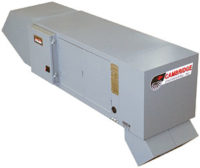“I believe a lot of people are being misled by the claims that are being made about these products,” said Dennis Wisner of Aire Serv of Mid Michigan, Lansing, Mich. “I’ve seen customers fall for these claims myself. Unfortunately, if you put enough money toward the promotion of a product, just like a politician, people will eventually be sold.”
Jim Cash, a consumer from Rochester, Minn., said, “The portable units have a place, but that place isn’t to replace whole home-heating systems.”
Yet many consumers believe that space heaters are more economical to operate and, in some cases, perform the same functions as a whole-house heating system.
“I think people purchase these items looking for a cheap remedy to their energy woes,” said Bob Haak of Black-Haak Heating, Greenville, Wis. “When they receive them, look at them, and try them out they are mad at themselves. They then feel the entire market is junk. We have a very nice-looking electric fireplace that will heat your room. It is not cheap but it works very well.
“People are reluctant to spend the extra money upfront and afterward are even more reluctant because their trust is gone.”
A Skewed Perception
Putting trust in a nationally advertised space heating product can also be a dangerous thing, according to one HVAC contractor. “I do think that ads for portable room space heaters and fireplaces make consumers believe they can find more affordable ways to heat their homes than with conventional furnaces,” said Steve Scott of Accu-Therm, Pitman, N.J. “This is because the ads are carefully scripted to play to, and to take advantage of, both consumer’s fears and their technical ignorance.
“The degree to which this skewed portrayal can be a very effective marketing scheme is clearly illustrated by the fact that my own father bought two of those high-end electric heaters for himself, despite the fact that he had ready access to my expert counsel in regard to their claimed performance. His annual electrical costs were already in the $700 range. If the high-end portable unit could have saved him 10 percent of that, which is very unlikely, his break-even point would have been nearly infinite if considering the time-value of money.”
Scott noted, however, that “a way that consumers may financially benefit is by using such portable products for heating substantially smaller areas of their homes.” He explained, “The cost savings resulting from not running their central system exceeds the higher-per-Btu cost of operating the straight electric heaters — although this is only briefly mentioned in the ads if at all.”
One consumer said she is not caught up in the marketing verbiage for space heaters. “I have seen people get fooled by these ads, thinking they will save on their gas/fuel oil bill when they won’t,” said Nicole Osborne Despres of Providence, R.I. “These heaters are great for one room, but what the ads don’t tell you is that since they are electric, your electric bill will go up. How much depends on usage. You could also overload a circuit causing a fuse to blow or a breaker to trip.”
Electricity may be the costliest energy source but it also may be the only affordable source for some homeowners in very specific circumstances. “Electric heaters are about the most costly way to produce heat,” said Robin Boyd, an HVAC business consultant in Lancaster, Pa. “I suppose if you are only using one or two rooms of a larger home, a couple of electric heaters may save overall energy costs simply by not using a central system using a more efficient fuel.
“Space heaters are only worthwhile if only one or two small spaces need heat. If you are heating more than 25 percent of your home, electric space heaters are going to cost more in energy than if you heated the entire home with a fossil fuel furnace or heat pump.
“But, this does bring up a very good point that it is up to the individual as to how much sacrifice they are willing to make in order to save energy. A 5,200-Btu heater is the same as an average hair dryer. This is not going increase the heat in a 200-square-foot room by very much.”
One HVAC contractor said that consumers are taken in by advertising claims — and those claims have lost him at least one customer. Tom Bynum of AAA Bynum Services, Warren, Mich., said, “I am seeing more and more people turning to these space heaters, especially when residential consumers have a problem with their furnace and are awaiting replacement or arrival of a specialized part.
“The high-end space heater that advertises ‘$1 a day’ operating cost to heat 1,000 square feet is employed and appreciated as natural and propane gas costs continue to rise. I lost a zoning add-on in a small two-story home when the homeowner said he solved his zoning problem for $300.”
It is true that space heaters, when used in large quantities, can provide a substitute to conventional heating systems. But at what cost?
“We’re here in Wisconsin,” said Kurt Dodge of D&M Heating, Milwaukee. “You would need to buy several space heaters to do a whole house and keep it from freezing when the temperatures hit minus 15 degrees. We still install the occasional auxiliary heater in the basement, where some people choose to live instead of upstairs, but mostly it’s central furnaces and boilers.”
“A space heater never really replaces a furnace,” said Dave Boelcke of Boelcke Heating, Benton Harbor, Mich. “People buy space heaters to take care of a problem area but still need their furnace. However, anything that draws attention to a heating problem has potential to help the HVAC contractor rather than harm him.”
An Educated Choice
One HVAC contractor said that if people were more educated about heating physics and heating systems, they would make the right choices. “People should refer to the first law of thermodynamics,” said Mike Paine of ABetter Heating & Air, Lovejoy, Ga. “Energy can be transformed or changed from one form to another, but cannot be created or destroyed. The room, apartment, or house is going to use (leak) — based on temperature differentials — a set amount of energy that will need to be replaced in order to maintain comfort. A watt is a watt, and a Btu is a Btu, we can’t change that.
“Proper design and application of higher EER, SEER, HSPF, and AFUE equipment, along with duct and envelope air sealing, insulation, windows, and other home thermal improvements are the only real answer here.”
Dodge believes the comparison between space heating and mechanical HVAC systems is a complex issue. “One would need to evaluate the cost of fuel for their primary heating unit and then compare it to the cost of spot heating with individual electric heaters, room by room. I know that in the Northeast, most folks have a central unit that maintains the entire home at 50-55 degrees and then supplement in the room they are using with electric. If you are heating with fuel oil, this method is probably cost effective. With natural gas, depending on the efficiency of your primary unit and cost of fuel, there may be advantages.
“We would prefer to sell multiple stage or modulating heating units that are high efficiency and add zoning to modify the comfort to the occupied spaces.”
Don Gillis of Miller Heating & Air Conditioning, Fort Wayne, Ind., agrees that every application has to be looked at individually to match the size of the home and the price of fuel and electricity. “I’m biased to geothermal or hybrid systems,” he said. “I have a customer that has a small five-year-old ranch home. He puts a large portable heater in his hallway near the thermostat. There is only one central return air in the same hallway. He turns his breaker off to his central air unit, and puts it in cooling mode. I’m not sure how comfortable he is, but he swears he cuts his utility bills down 35 percent.”
“I think people are looking more towards wood/pellet stoves here in New England,” said Sylvan Tieger of S. Tieger Plumbing Co., Bronx, N.Y. “I have seen a rise in wood-fueled furnaces, as well. Space heaters and electric fireplaces are probably only beneficial for small spaces and those areas of the country where they do not have long, extremely cold winters. But I do recommend small electric heaters in many homes.”
One consumer said the issue of electric heat versus fossil fuel is not that easy to resolve. “The problem with traditional fossil fuel based furnaces is that you’re locked into a using a single fuel,” said Christopher Sikora of Albany, N.Y. “If you use electric heat, the power companies can use an array of fuel sources to generate electricity and they will buy the cheapest fuel source. That’s why electric prices have remained relatively stable in my area while fossil fuels have gone up considerably.
“I live in the Northeast, and in past years it cost me about $1,500 to fill my 550-gallon tank to heat my 1,600-square-foot home and make hot water using my oil furnace. I generally keep the thermostats set at 66˚, have zone heat, and the house is well insulated. On the coldest days I still had to augment the oil furnace with a couple of electric heaters to keep things comfortable. The $1,500 hit for oil to my bank account in November/December was hard to swallow.”
Publication date: 05/14/2012







